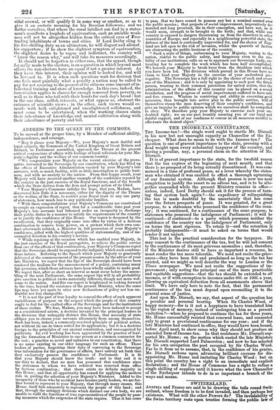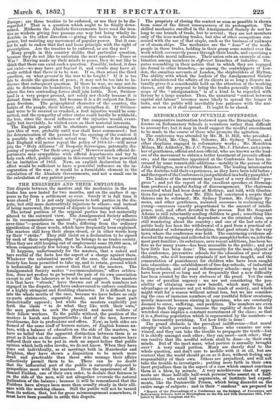WITZERLAND. .
AUSTRIA and France are said to be drawing the toils round Swit- zerland, whose freedom is to be first invaded, and then perhaps her existence. What will the other Powers do ? The inviolability of the Swiss territory rests upon treaties forming the publie law of Europe : are those treaties to be enforced, or are they to be dis- regarded ? That is a question which ought to be finally deter- mined. Hitherto the Absolute Governments have used the trea- ties as wickets giving free passage one way but being wholly in- flexible in the other direction — giving free action to absolute power' but resisting any movement of popular power. But it can- not be safe to endow that fast and loose principle with the right of prescription. Are the treaties to be enforced, or are they not? Many people in this country dislike that particular question, because they do not like to entertain the next question—Peace or War ? Having made up their minds to peace, they do not like to think that there can exist such a question. Possibly, indeed, it does not exist—we may have got beyond it, and events may have al- ready settled that there is to be war. If so, then arises the third questions on what ground is the war to be fought ? If it is too late to decide the question of peace, it may not be too late to in- fluence that subsequent question. If there be war, we may not be able to determine its boundaries, but it is something to determine where the two contending forces shall join battle. Now, Switzer- land is a very proper ground, not solely nor chiefly because it is distant from this country, but because it is a fit outpost for Euro- pean freedom. The geographical character of the country, the habits of the people, their history, all strengthen it. If Switzer- land were to be coerced or crushed, a foul injustice would be com- mitted, and the sympathy of other states could hardly be withheld; the less, since the moral influence of the injustice would, event- nally but inevitably, be visited even on their material interests.
The English people will be obstinate against sanctioning the bare idea of war, probably until war shall have commenced ; but the determination of the ground for the opening of the contest it is possible to effect without actual war. We take it for granted that England will never repeat the policy of 1814-15—will never join the "Holy Alliance" of Despotic Sovereigns, paternally dis- posing of peoples "for their own good." However much official de- partments may sympathize with official departments and try to help each other, public opinion in this country will be too powerful for an imitation of 1815. Now, an explicit declaration to that effect would be sufficient to have a powerful influence on the in- auguration of the war ; it would be a formidable element in the calculation of the Absolute Governments, and not a small one in the calculation of any patriot party.



























 Previous page
Previous page